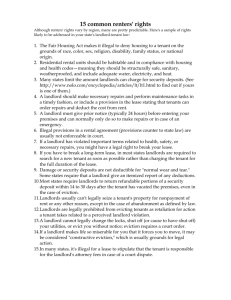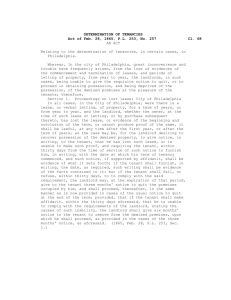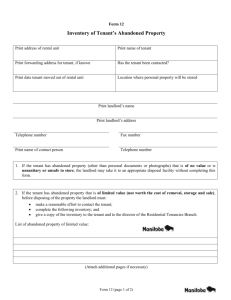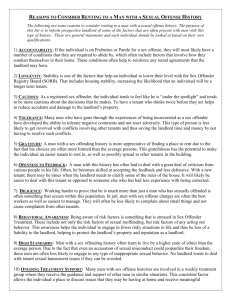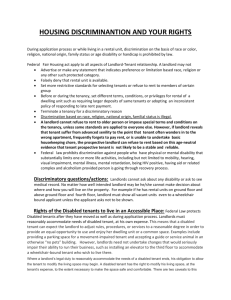ADA & FHAct: Serving Clients with Disabilities in Housing
advertisement
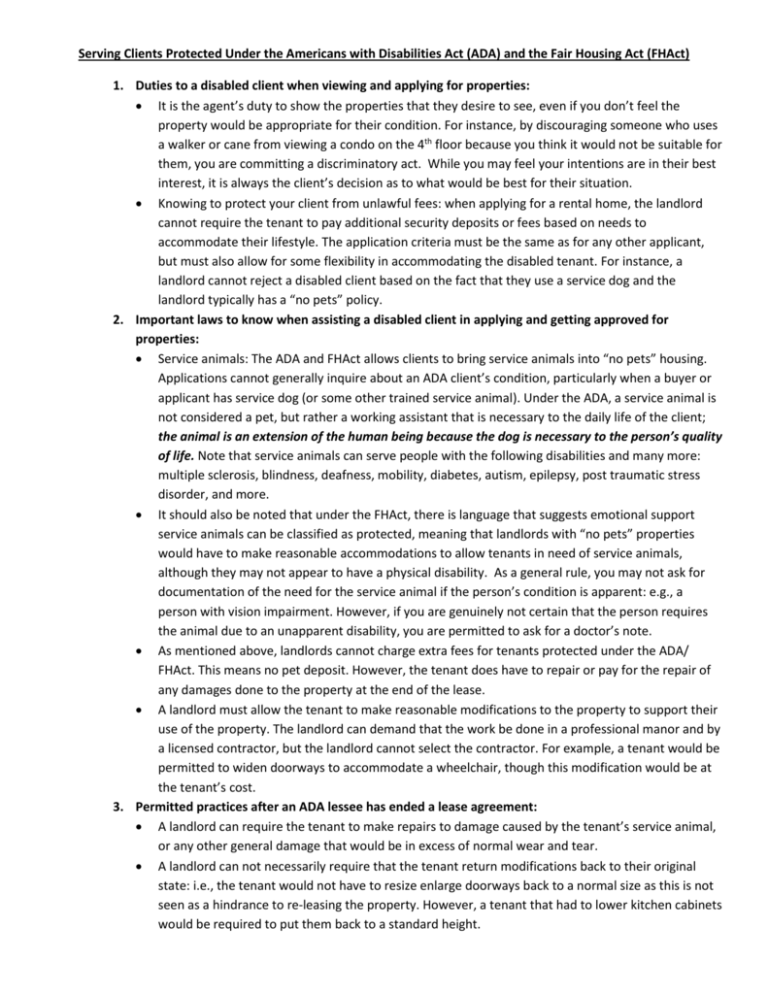
Serving Clients Protected Under the Americans with Disabilities Act (ADA) and the Fair Housing Act (FHAct) 1. Duties to a disabled client when viewing and applying for properties: It is the agent’s duty to show the properties that they desire to see, even if you don’t feel the property would be appropriate for their condition. For instance, by discouraging someone who uses a walker or cane from viewing a condo on the 4th floor because you think it would not be suitable for them, you are committing a discriminatory act. While you may feel your intentions are in their best interest, it is always the client’s decision as to what would be best for their situation. Knowing to protect your client from unlawful fees: when applying for a rental home, the landlord cannot require the tenant to pay additional security deposits or fees based on needs to accommodate their lifestyle. The application criteria must be the same as for any other applicant, but must also allow for some flexibility in accommodating the disabled tenant. For instance, a landlord cannot reject a disabled client based on the fact that they use a service dog and the landlord typically has a “no pets” policy. 2. Important laws to know when assisting a disabled client in applying and getting approved for properties: Service animals: The ADA and FHAct allows clients to bring service animals into “no pets” housing. Applications cannot generally inquire about an ADA client’s condition, particularly when a buyer or applicant has service dog (or some other trained service animal). Under the ADA, a service animal is not considered a pet, but rather a working assistant that is necessary to the daily life of the client; the animal is an extension of the human being because the dog is necessary to the person’s quality of life. Note that service animals can serve people with the following disabilities and many more: multiple sclerosis, blindness, deafness, mobility, diabetes, autism, epilepsy, post traumatic stress disorder, and more. It should also be noted that under the FHAct, there is language that suggests emotional support service animals can be classified as protected, meaning that landlords with “no pets” properties would have to make reasonable accommodations to allow tenants in need of service animals, although they may not appear to have a physical disability. As a general rule, you may not ask for documentation of the need for the service animal if the person’s condition is apparent: e.g., a person with vision impairment. However, if you are genuinely not certain that the person requires the animal due to an unapparent disability, you are permitted to ask for a doctor’s note. As mentioned above, landlords cannot charge extra fees for tenants protected under the ADA/ FHAct. This means no pet deposit. However, the tenant does have to repair or pay for the repair of any damages done to the property at the end of the lease. A landlord must allow the tenant to make reasonable modifications to the property to support their use of the property. The landlord can demand that the work be done in a professional manor and by a licensed contractor, but the landlord cannot select the contractor. For example, a tenant would be permitted to widen doorways to accommodate a wheelchair, though this modification would be at the tenant’s cost. 3. Permitted practices after an ADA lessee has ended a lease agreement: A landlord can require the tenant to make repairs to damage caused by the tenant’s service animal, or any other general damage that would be in excess of normal wear and tear. A landlord can not necessarily require that the tenant return modifications back to their original state: i.e., the tenant would not have to resize enlarge doorways back to a normal size as this is not seen as a hindrance to re-leasing the property. However, a tenant that had to lower kitchen cabinets would be required to put them back to a standard height.


